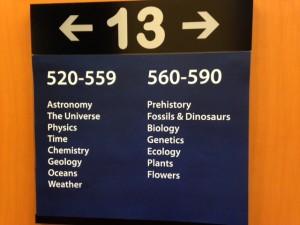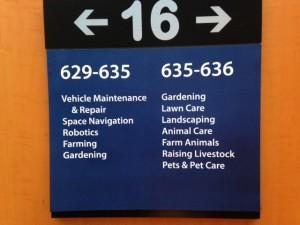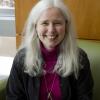Posted by Heidi L on Monday, Oct 6, 2014
While working at the Reference Desk last week, I got a question from a couple of young students. More than anything I wanted to give a simple answer that would signal to them that the Library is easy to use. But no such luck, because the question—Where are your books on prairie plants?—resulted in two places to look.
The Dewey Decimal Classification scheme, used in many public libraries, provides a framework for grouping materials together by subject. More than 100 years old, the scheme has been resilient and adaptable. But sometimes it conspires to keep similar things apart, if the approach to the subject matter differs. I think the best illustration for this is the 500s and 600s. The 500s are “Pure Science” and the 600s are “Technology,” sometimes referred to as “applied science”.
 Some examples:
Some examples:
The Dewey Decimal classification numbers in the 530s are about physics, with electricity at 537. But if you are interested in wiring your house, you would look at applied physics in 621.31924.
In the 580s you find books about the natural history and identification of plants; and in the 600s, you find the books about gardening and cooking with plants.
In the classification number 590, you find books about animals—their history and biology. But look in the 600s to find books about animals in the subject areas of farming, cooking, and keeping animals as pets.
Doing a subject search in the catalog will help you identify all the places you can look for what you need. If you do a subject search for “parrots”, the catalog will send you to 598.71 for “Parrots of the World: An Identification Guide” and also to 636.6865 for books on training and caring for a pet parrot. If you do a subject search for “prairie plants,” as I did for the students last week, the catalog will direct you to 581.744 for “An Illustrated Guide to Iowa Prairie Plants” and also to 635.95 for “A Practical Guide to Prairie Reconstruction”.

Browsing an area of the collection that you know is one way of finding what you need, but there may be similar items of interest in other areas. We hope that you will check with staff at the Reference Desk whenever you have a question about where to find a subject that interests you. Chances are there is more than one place to look, and we can help you find them all.

